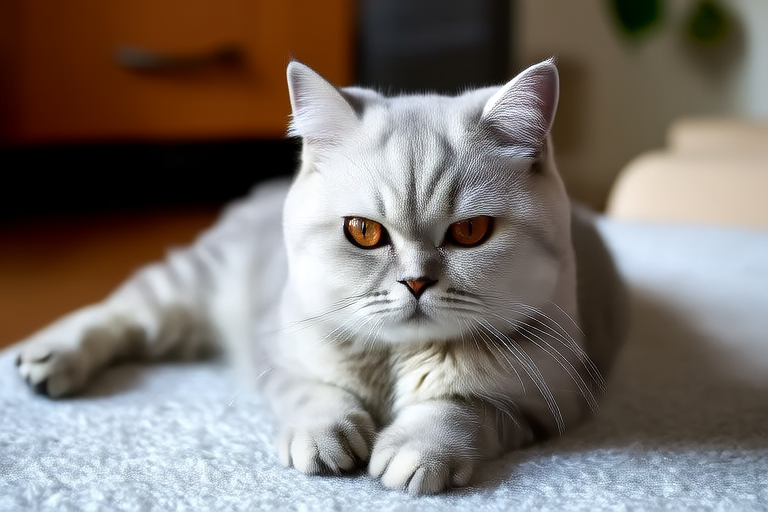How to Care for Your Silvery British Shorthair Like a Pro
Welcome to your guide on how to care for your Silvery British Shorthair like a pro! These cats are known for their robust, muscular bodies, calm demeanor, and their striking silvery coats. To ensure that your British Shorthair leads a healthy, happy life, it’s essential to understand their unique dietary needs, grooming routines, exercise requirements, potential health issues, and socialization needs. Let’s dive into each aspect to help you become the best caretaker possible.
Dietary Needs
The first step in caring for your Silvery British Shorthair is ensuring they have a balanced diet. British Shorthairs are known for their hearty appetites and can easily become overweight if not monitored carefully. A high-quality, protein-rich diet is crucial for maintaining muscle mass and overall health. Look for cat food that lists meat as the primary ingredient, avoiding fillers like corn or soy. Additionally, consider incorporating wet food into their diet to increase hydration, which is particularly important for cats who might not drink enough water.
It’s also wise to consult with your veterinarian about the appropriate portion sizes and feeding schedule. British Shorthairs are prone to obesity, so monitoring their weight and adjusting their diet accordingly is vital. Avoid overfeeding by measuring out meals and offering treats sparingly. Treats should make up no more than 10% of their daily caloric intake.
Grooming Tips Specific to Their Silver Coat
Your Silvery British Shorthair’s coat is one of its most distinctive features, and proper grooming is essential to keep it looking its best. The silver coat of the British Shorthair is short but dense, and while it does shed, regular brushing can significantly reduce shedding and help maintain a healthy coat.
Brush your cat at least twice a week with a soft-bristled brush or a rubber grooming mitt. This will remove loose hair, distribute natural oils throughout the coat, and prevent matting. During seasonal changes, especially when shedding increases, you may need to brush more frequently.
Bathing is generally unnecessary for these cats unless they get into something particularly messy. However, if you do decide to bathe your cat, use a mild, pH-balanced shampoo designed for cats and be sure to rinse thoroughly to avoid any residue that could irritate their skin. After bathing, dry them thoroughly with a towel or a low-heat hair dryer set on a cool setting.
In addition to brushing and bathing, check your cat’s ears regularly for signs of infection or wax buildup. Clean the ears gently with a cotton ball and a veterinarian-recommended ear cleaning solution. Also, trim their nails every few weeks to prevent overgrowth and potential injury.
Exercise Requirements
Despite their muscular build, British Shorthairs are relatively sedentary compared to many other breeds. They enjoy lounging around the house and don’t require extensive physical activity. However, providing opportunities for play and mental stimulation is still important for their well-being.
Interactive toys such as feather wands, laser pointers, and puzzle feeders can encourage your cat to engage in active play. Rotate toys periodically to keep things interesting and stimulate their curiosity. You can also set up climbing structures or shelves to provide vertical space for exploration and perching.
Playtime doesn’t have to be intense; even short sessions of interactive play can help burn off excess energy and strengthen the bond between you and your cat. Aim for at least 15 minutes of playtime each day, and remember that quality interaction is more valuable than quantity.
Common Health Issues
Like all breeds, Silvery British Shorthairs are susceptible to certain health issues. Being aware of these conditions can help you provide early intervention and maintain your cat’s health.
Obesity: As mentioned earlier, obesity is a significant concern for this breed. Regular weigh-ins and monitoring their diet are key preventive measures. If your cat is already overweight, consult your veterinarian for a safe weight loss plan.
Hypertrophic Cardiomyopathy (HCM): This is a heart condition that causes thickening of the heart muscle, potentially leading to heart failure. While not exclusive to British Shorthairs, it’s more commonly seen in this breed. Early detection through regular veterinary check-ups and possibly genetic testing can improve outcomes.
Congenital Hip Dysplasia: Some British Shorthairs may suffer from hip dysplasia, a condition where the hip joint doesn’t develop properly. Signs include limping, difficulty jumping, and reluctance to move. Managing weight and providing joint supplements under veterinary guidance can help alleviate symptoms.
Allergies: Some British Shorthairs may develop allergies, often manifesting as skin irritation or gastrointestinal upset. Identifying the allergen and managing symptoms with appropriate treatments, such as hypoallergenic diets or medications, can help your cat feel better.
Advice on Socializing This Breed
Socializing your Silvery British Shorthair is an important part of their development, ensuring they grow up to be confident, well-adjusted pets. British Shorthairs are generally friendly and adaptable, but early socialization can enhance their behavior.
Introduce your kitten to various people, animals, and environments gradually. Positive reinforcement, such as treats and praise, can encourage good behavior during these interactions. Consider enrolling in a kitten kindergarten class, where they can learn basic commands and interact with other kittens in a controlled environment.
Adult British Shorthairs typically enjoy human company and can form strong bonds with their families. Spend quality time with your cat, engaging in activities they enjoy, and creating a comfortable, stimulating home environment. Providing a scratching post, cozy bed, and access to windows for bird-watching can enrich their daily lives.
If you have children or other pets, supervise initial interactions and teach everyone how to handle the cat gently. Encourage gentle petting and playing to foster a positive relationship. Consistent, respectful handling will help your cat feel secure and loved.
In conclusion, caring for your Silvery British Shorthair requires attention to their dietary needs, regular grooming,适度的锻炼,以及了解常见的健康问题。通过遵循这些建议,您可以确保您的猫过上健康快乐的生活。无论是新猫主人还是有经验的猫主人,都可以从这些实用的建议中受益。记住,每个猫都是独一无二的,所以根据您猫的具体需求调整护理计划是很重要的。祝您和您的猫度过美好的时光!
